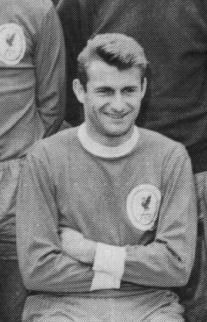|

Born:
Golborne, Lancashire, 20.7. 1938
Signed: May 1959
Games:
484 (5)
Goals:
285
Honours: First Division 63/64, 65/66
Second Division 61/62
FA Cup 64/65
NBE 99
England Caps: 34
Other clubs: Bolton Wanderers 69/70-71/72 |
|
Of all the great players to parade their skills on the
Anfield turf, only one of them was ever knighted by the Kop. The
recipient of that honour was of course "Sir" Roger Hunt, as
the fans on the famous terrace christened him to recognise his
outstanding goalscoring contribution to the Liverpool cause.
Roger's goalscoring record was phenomenal and stands
comparison with the best that any other striker has offered. No one has
scored more League goals for the club or reached the 50 mark in fewer
games than Hunt.
Furthermore, he hit his 285 Liverpool goals in just over 200 more
matches, struck a record 41 times in 41 games during the promotion
campaign og 1961-62, returned hauls of 31 and 30 League goals in the
Championchip season og 1963-64 and 1965-66, and was top scorer in nine
of his ten full seasons at the club.
His favoured tools of the trade were blistering pace,
kick-started by a jolting burst of acceleration, the physical strength
that bought him extra time and space in the congested penalty box, a
rocket of a shot and the seemingly inexhaustible stamina which fuelled
his selfless working and chasing when not in possession.
The 1965-66 season should have been even more
memorable. Although victory in the League was followed by defeat in the
European Cup-Winners' Cup final, Roger still had a World Cup to look
foreward to with England. But although he enjoyed playing his full part
in helping lift the Jules Rimet trophy that summer, the tournament
marked the beginning of what became a sad, unfitting end to his
international career.
Despite scoring vital goals in the early rounds, Roger remains the least
honoured of that England side and afterwards became the victim of a
torrent of unfair criticism that bordered on a vendetta simply because
he had been perceived as the man who deprived the then national hero
Jimmy Greaves of a place in the side.
Ironically, Hunt and Greaves had begun the tournament playing alongside
each other and so it was actually Geoff Hurst who replaced the Londoner
when injury forced him to drop out. Alf Ramsey kept faith with the new
pairing for the final against West Germany, and while Hunt's unselfish
workaholic performance delighted his manager it did not find any favour
with the wider public who had demanded the return of Greaves.
Eventually, Roger felt able to end his persecution only by making
himself unavailable for selection a couple of years later.
Fortunately, Merseyside has never cared very much about what the rest of
the country thinks and his beloved Anfield Hunt was always guaranteed a
hero's welcome. So much so that after he had moved to Bolton in 1969 at
the age of 31 a 56.000 full house turned out for his testimonial game in
1972.
The service that Roger Hunt gave the club made him a worthy recipient of
that tribute, and the salute that the Anfield crowd afforded him that
night was not merely a recognition of the volume of goals that he
recorded in their colours, but also of the proportion of those strikes
that were scored when the pressure was greatest and the stakes were
highest.
(From "Liverpool's Greatest Players" by David Walmsley)
7.3.00:
Roger Hunt, along with all the other surviving members of England's World Cup winning squad of 1966, receives his MBE at Buckingham Palace today.
Congratulations, Roger !!!!!

Thor Zakariassen © |